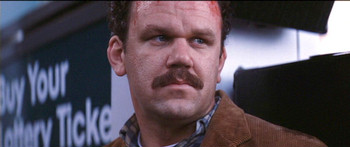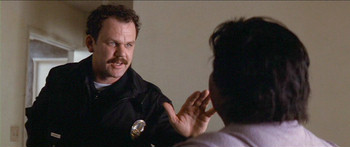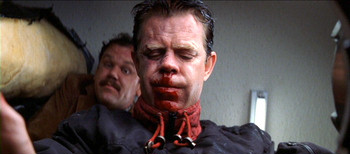(A contribution to Strange Culture’s Film + Faith Blog-a-thon.)
 The first images of Jim Kurring involve his morning routine, and it’s nothing remarkable: He eats, he showers, he reads the paper, he exercises.
The first images of Jim Kurring involve his morning routine, and it’s nothing remarkable: He eats, he showers, he reads the paper, he exercises.
But there are little hints about how we’re supposed to react to him. He laughs out loud – and not very convincingly – at something on the Today show. When he’s lifting weights, we see one of those inspirational posters encouraging “determination.” And he prays, on his knees at the foot of his bed, with a cross looking down upon him. When he finishes, he gets up and claps his hands together once, as if Team God had just broken from the huddle. We learn through voice-over that he participates in some dating service, or at the least runs a personal ad. He’s a cop, and he gives himself a pep talk in the squad car.
Kurring (played by John C. Reilly with light exaggeration but without condescension) is introduced at the tail end of a sequence that contrasts him with characters who are busy – selling misogyny, having casual sex, cheating on a spouse, visiting the doctor, correctly answering questions on game shows, scolding a child, getting prepped for braces, crashing a car, nursing, dying, panicking … . And Jim’s having a cup of coffee and talking to God and himself. We sense in him a desperation, a longing for genuine human contact, a break from his isolation.
It seems odd, even early in Paul Thomas Anderson’s Magnolia, that Jim Kurring comes off as comic relief, and as a fool. It might be different if he were put beside noble, sharp, or enlightened characters, but writer/director Anderson shows this obviously simple man in a context of misery, vanity, illness, and general frenzy. We should find some solace in his quiet habits, some refuge in the mundane, and some poignancy in his loneliness. Instead, we see a dullard.
Part of that is the nature of movies. We might like having decent if dim people in the real world, but as narrative creations they’re troublesome. The simpleton is only as interesting as the activity around him – a concept taken to an extreme in Forrest Gump.
 But while it’s reasonable to emerge from Magnolia still thinking that Jim is feeble-minded, only a cold person could deny his gentleness, his wisdom, and the generosity of his heart. He starts by surrounding himself with pitiful platitudes and over the course of the movie finds the courage to back them up. In voice-over near the end of the movie, Jim says, “Sometimes people need a little help. Sometimes people need to be forgiven,” and the words have been transformed through the authority of action. He is Magnolia’s hero, and I don’t use that term lightly.
But while it’s reasonable to emerge from Magnolia still thinking that Jim is feeble-minded, only a cold person could deny his gentleness, his wisdom, and the generosity of his heart. He starts by surrounding himself with pitiful platitudes and over the course of the movie finds the courage to back them up. In voice-over near the end of the movie, Jim says, “Sometimes people need a little help. Sometimes people need to be forgiven,” and the words have been transformed through the authority of action. He is Magnolia’s hero, and I don’t use that term lightly.
He also approaches a Christian ideal, providing support, companionship, and guidance – free of judgment – to a troubled, drug-abusing young woman and to a troubled, thieving former game-show winner.
Of course, hospice nurse Phil Parma is Magnolia’s other hero, but he’s not much of a character; he remains at the end what he was at the beginning.
 Our initial suspicions about Kurring are reinforced by his encounters early in the movie with Marcie (she who drags the couch) and Dixon (the child whose foul language turns Jim dismissive). The cop actually handles the belligerent, sly Marcie deftly:
Our initial suspicions about Kurring are reinforced by his encounters early in the movie with Marcie (she who drags the couch) and Dixon (the child whose foul language turns Jim dismissive). The cop actually handles the belligerent, sly Marcie deftly:
Jim: “I’m gonna ask you one more time: Are you alone in here?”
Marcie: “What does it look like?”
Jim: “No one else in here?”
Marcie: “You’re here.”
Jim: “Okay. That’s true. Is anyone else, besides me and besides you in this house?”
Marcie: “No. I said that.”
Jim: “Are you lyin’ to me?”
Marcie: “I live alone.”
Jim: “Maybe so, but I’m gonna ask you one more time: Is anyone else in this house right now?”
He might not be terribly bright, but Jim is a good enough cop to parse Marcie’s non-answers and (for the most part) subdue her. The comedy here is drawn from the situation, the way in which is a serious situation (a dead body in the closet) can be funnily absurd. (“Do not drag that couch any further” and “That ain’t mine” are ridiculous enough that they would be at home in This Is Spinal Tap.)
Yet Kurring is still set up as a buffoon. This is Los Angeles, after all, and he has all the edge and street cred of Officer Friendly, square to a fault when dealing with the young rapper he tells to “finish it up without the lip.”
 This is simply who Kurring is: a man genuinely taken aback by a date’s use of “piss” and “shit.” So a good deal of his development as a character is a change in audience perception rather than his evolution as a person. We begin by mocking him and finally recognize that for all his faults, Kurring is a decent person, in the best sense of the word, and that the world would be lucky to have more like him.
This is simply who Kurring is: a man genuinely taken aback by a date’s use of “piss” and “shit.” So a good deal of his development as a character is a change in audience perception rather than his evolution as a person. We begin by mocking him and finally recognize that for all his faults, Kurring is a decent person, in the best sense of the word, and that the world would be lucky to have more like him.
And he doesn’t grow, exactly; he blossoms. He starts as a bud – potential – and through Magnolia narrows the gulf between his stated ideals and his actions.


Thanks for this. Magnolia is one of my favorite times, and I’ve always loved how PT treats him as a holy fool. Next to all of the film’s other characters, Jim comes across as positively at peace. Sure, he loses his gun, he wants to get into a relationship, but he’s patient, he’s hopeful.
It’s one of the fairest, realest portrayals of Christianity I’ve seen on film.
Thanks for these insights into an excellent film.